Critical Reflection on Multiculturalism in Australia: MSW Assignment
VerifiedAdded on 2023/06/03
|10
|3003
|416
Report
AI Summary
This report provides a critical reflection on multiculturalism in Australia, focusing on an online discussion about the topic. It explores themes such as the impact of immigration policies, the role of organizations like the Special Broadcasting Service, and the significance of the Equality Act (2010). The report analyzes the complexities and contradictions within multiculturalism, including the balance between cultural diversity and societal norms. It also examines the author's self-learning process, highlighting key concepts like interculturalism, globalization, and the importance of language in understanding cultural differences. The report discusses the contributions of different cultural groups and governmental interventions in preserving cultural heritage. The author reflects on the challenges and opportunities of multiculturalism, emphasizing the importance of mutual understanding and ethical conduct in fostering a cohesive society. Furthermore, it explores the relationship between individual identity, cultural values, and the broader societal context, particularly in the Australian setting. The author also includes the analysis of the concepts like mirror image, which makes the individuals aware of the demarcation between reality and appearance.
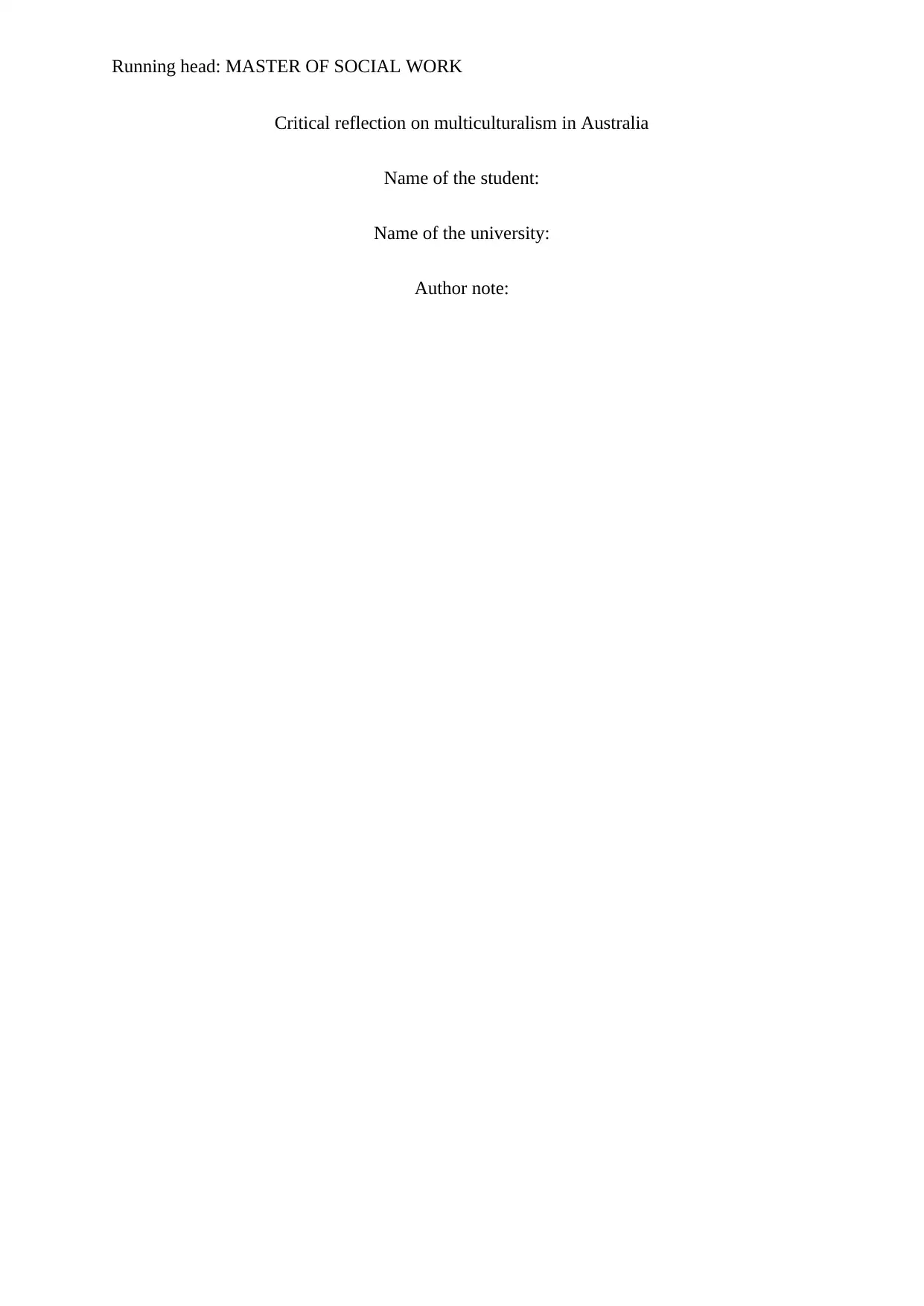
Running head: MASTER OF SOCIAL WORK
Critical reflection on multiculturalism in Australia
Name of the student:
Name of the university:
Author note:
Critical reflection on multiculturalism in Australia
Name of the student:
Name of the university:
Author note:
Paraphrase This Document
Need a fresh take? Get an instant paraphrase of this document with our AI Paraphraser
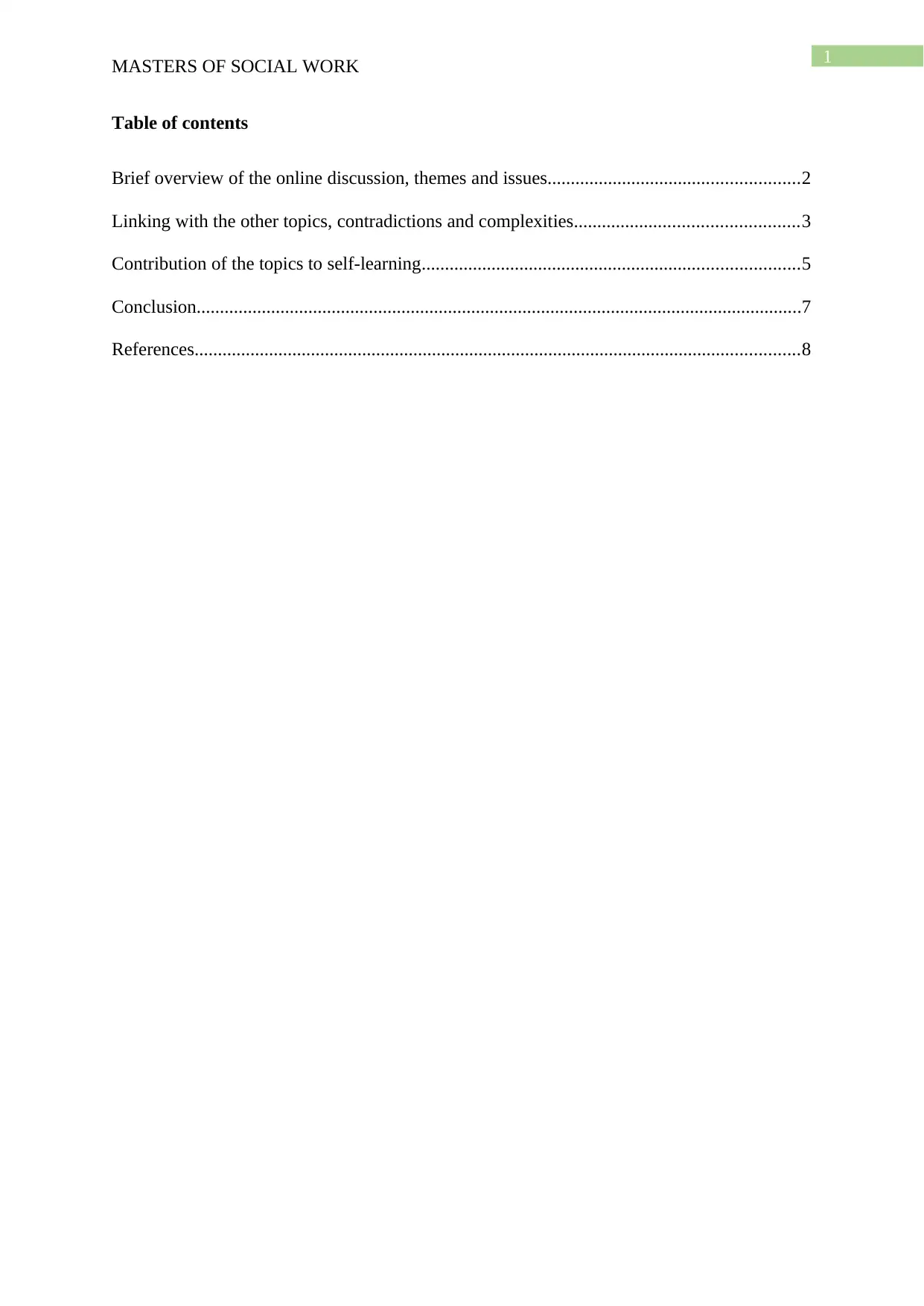
1
MASTERS OF SOCIAL WORK
Table of contents
Brief overview of the online discussion, themes and issues......................................................2
Linking with the other topics, contradictions and complexities................................................3
Contribution of the topics to self-learning.................................................................................5
Conclusion..................................................................................................................................7
References..................................................................................................................................8
MASTERS OF SOCIAL WORK
Table of contents
Brief overview of the online discussion, themes and issues......................................................2
Linking with the other topics, contradictions and complexities................................................3
Contribution of the topics to self-learning.................................................................................5
Conclusion..................................................................................................................................7
References..................................................................................................................................8
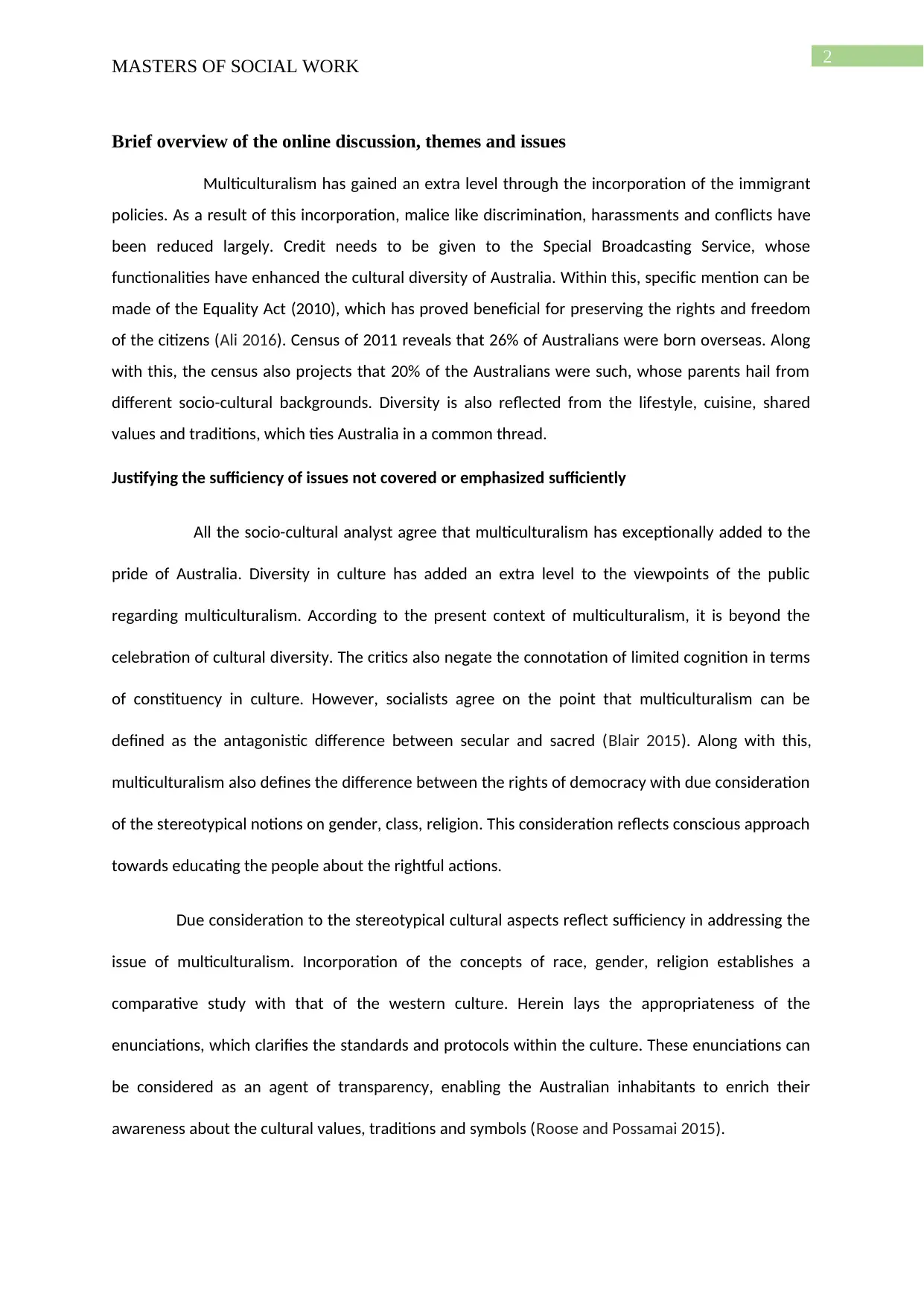
2
MASTERS OF SOCIAL WORK
Brief overview of the online discussion, themes and issues
Multiculturalism has gained an extra level through the incorporation of the immigrant
policies. As a result of this incorporation, malice like discrimination, harassments and conflicts have
been reduced largely. Credit needs to be given to the Special Broadcasting Service, whose
functionalities have enhanced the cultural diversity of Australia. Within this, specific mention can be
made of the Equality Act (2010), which has proved beneficial for preserving the rights and freedom
of the citizens (Ali 2016). Census of 2011 reveals that 26% of Australians were born overseas. Along
with this, the census also projects that 20% of the Australians were such, whose parents hail from
different socio-cultural backgrounds. Diversity is also reflected from the lifestyle, cuisine, shared
values and traditions, which ties Australia in a common thread.
Justifying the sufficiency of issues not covered or emphasized sufficiently
All the socio-cultural analyst agree that multiculturalism has exceptionally added to the
pride of Australia. Diversity in culture has added an extra level to the viewpoints of the public
regarding multiculturalism. According to the present context of multiculturalism, it is beyond the
celebration of cultural diversity. The critics also negate the connotation of limited cognition in terms
of constituency in culture. However, socialists agree on the point that multiculturalism can be
defined as the antagonistic difference between secular and sacred (Blair 2015). Along with this,
multiculturalism also defines the difference between the rights of democracy with due consideration
of the stereotypical notions on gender, class, religion. This consideration reflects conscious approach
towards educating the people about the rightful actions.
Due consideration to the stereotypical cultural aspects reflect sufficiency in addressing the
issue of multiculturalism. Incorporation of the concepts of race, gender, religion establishes a
comparative study with that of the western culture. Herein lays the appropriateness of the
enunciations, which clarifies the standards and protocols within the culture. These enunciations can
be considered as an agent of transparency, enabling the Australian inhabitants to enrich their
awareness about the cultural values, traditions and symbols (Roose and Possamai 2015).
MASTERS OF SOCIAL WORK
Brief overview of the online discussion, themes and issues
Multiculturalism has gained an extra level through the incorporation of the immigrant
policies. As a result of this incorporation, malice like discrimination, harassments and conflicts have
been reduced largely. Credit needs to be given to the Special Broadcasting Service, whose
functionalities have enhanced the cultural diversity of Australia. Within this, specific mention can be
made of the Equality Act (2010), which has proved beneficial for preserving the rights and freedom
of the citizens (Ali 2016). Census of 2011 reveals that 26% of Australians were born overseas. Along
with this, the census also projects that 20% of the Australians were such, whose parents hail from
different socio-cultural backgrounds. Diversity is also reflected from the lifestyle, cuisine, shared
values and traditions, which ties Australia in a common thread.
Justifying the sufficiency of issues not covered or emphasized sufficiently
All the socio-cultural analyst agree that multiculturalism has exceptionally added to the
pride of Australia. Diversity in culture has added an extra level to the viewpoints of the public
regarding multiculturalism. According to the present context of multiculturalism, it is beyond the
celebration of cultural diversity. The critics also negate the connotation of limited cognition in terms
of constituency in culture. However, socialists agree on the point that multiculturalism can be
defined as the antagonistic difference between secular and sacred (Blair 2015). Along with this,
multiculturalism also defines the difference between the rights of democracy with due consideration
of the stereotypical notions on gender, class, religion. This consideration reflects conscious approach
towards educating the people about the rightful actions.
Due consideration to the stereotypical cultural aspects reflect sufficiency in addressing the
issue of multiculturalism. Incorporation of the concepts of race, gender, religion establishes a
comparative study with that of the western culture. Herein lays the appropriateness of the
enunciations, which clarifies the standards and protocols within the culture. These enunciations can
be considered as an agent of transparency, enabling the Australian inhabitants to enrich their
awareness about the cultural values, traditions and symbols (Roose and Possamai 2015).
⊘ This is a preview!⊘
Do you want full access?
Subscribe today to unlock all pages.

Trusted by 1+ million students worldwide
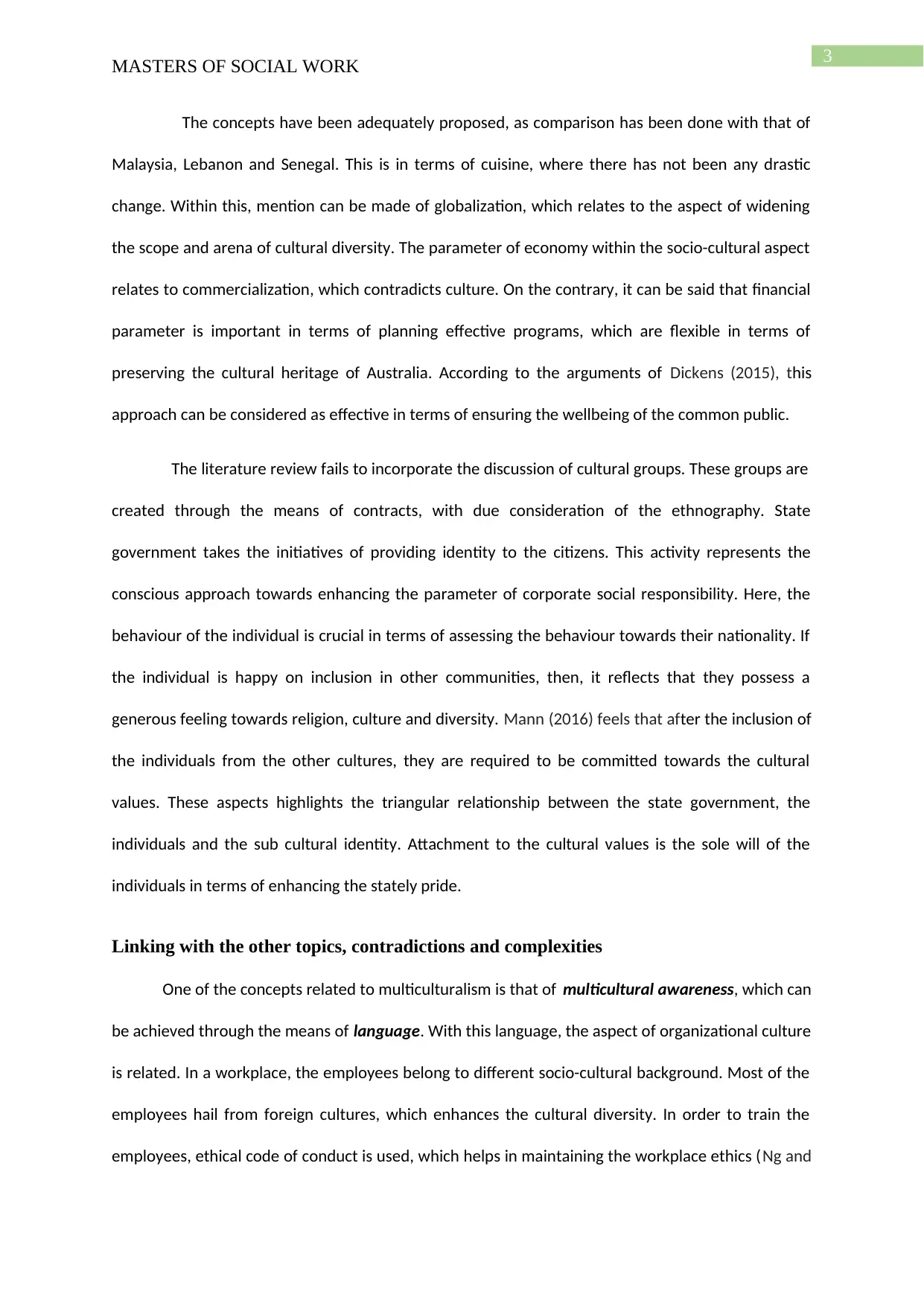
3
MASTERS OF SOCIAL WORK
The concepts have been adequately proposed, as comparison has been done with that of
Malaysia, Lebanon and Senegal. This is in terms of cuisine, where there has not been any drastic
change. Within this, mention can be made of globalization, which relates to the aspect of widening
the scope and arena of cultural diversity. The parameter of economy within the socio-cultural aspect
relates to commercialization, which contradicts culture. On the contrary, it can be said that financial
parameter is important in terms of planning effective programs, which are flexible in terms of
preserving the cultural heritage of Australia. According to the arguments of Dickens (2015), this
approach can be considered as effective in terms of ensuring the wellbeing of the common public.
The literature review fails to incorporate the discussion of cultural groups. These groups are
created through the means of contracts, with due consideration of the ethnography. State
government takes the initiatives of providing identity to the citizens. This activity represents the
conscious approach towards enhancing the parameter of corporate social responsibility. Here, the
behaviour of the individual is crucial in terms of assessing the behaviour towards their nationality. If
the individual is happy on inclusion in other communities, then, it reflects that they possess a
generous feeling towards religion, culture and diversity. Mann (2016) feels that after the inclusion of
the individuals from the other cultures, they are required to be committed towards the cultural
values. These aspects highlights the triangular relationship between the state government, the
individuals and the sub cultural identity. Attachment to the cultural values is the sole will of the
individuals in terms of enhancing the stately pride.
Linking with the other topics, contradictions and complexities
One of the concepts related to multiculturalism is that of multicultural awareness, which can
be achieved through the means of language. With this language, the aspect of organizational culture
is related. In a workplace, the employees belong to different socio-cultural background. Most of the
employees hail from foreign cultures, which enhances the cultural diversity. In order to train the
employees, ethical code of conduct is used, which helps in maintaining the workplace ethics (Ng and
MASTERS OF SOCIAL WORK
The concepts have been adequately proposed, as comparison has been done with that of
Malaysia, Lebanon and Senegal. This is in terms of cuisine, where there has not been any drastic
change. Within this, mention can be made of globalization, which relates to the aspect of widening
the scope and arena of cultural diversity. The parameter of economy within the socio-cultural aspect
relates to commercialization, which contradicts culture. On the contrary, it can be said that financial
parameter is important in terms of planning effective programs, which are flexible in terms of
preserving the cultural heritage of Australia. According to the arguments of Dickens (2015), this
approach can be considered as effective in terms of ensuring the wellbeing of the common public.
The literature review fails to incorporate the discussion of cultural groups. These groups are
created through the means of contracts, with due consideration of the ethnography. State
government takes the initiatives of providing identity to the citizens. This activity represents the
conscious approach towards enhancing the parameter of corporate social responsibility. Here, the
behaviour of the individual is crucial in terms of assessing the behaviour towards their nationality. If
the individual is happy on inclusion in other communities, then, it reflects that they possess a
generous feeling towards religion, culture and diversity. Mann (2016) feels that after the inclusion of
the individuals from the other cultures, they are required to be committed towards the cultural
values. These aspects highlights the triangular relationship between the state government, the
individuals and the sub cultural identity. Attachment to the cultural values is the sole will of the
individuals in terms of enhancing the stately pride.
Linking with the other topics, contradictions and complexities
One of the concepts related to multiculturalism is that of multicultural awareness, which can
be achieved through the means of language. With this language, the aspect of organizational culture
is related. In a workplace, the employees belong to different socio-cultural background. Most of the
employees hail from foreign cultures, which enhances the cultural diversity. In order to train the
employees, ethical code of conduct is used, which helps in maintaining the workplace ethics (Ng and
Paraphrase This Document
Need a fresh take? Get an instant paraphrase of this document with our AI Paraphraser
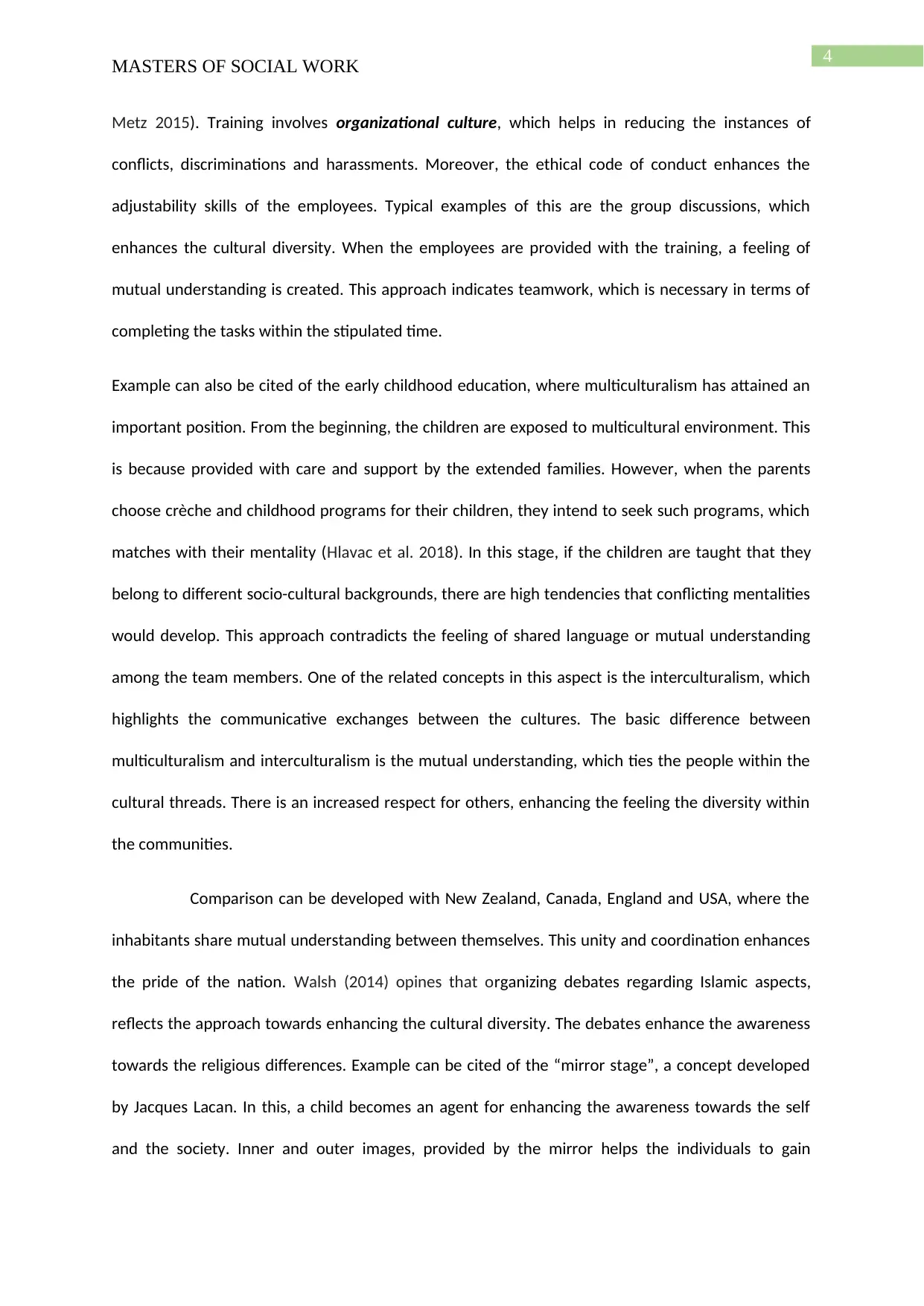
4
MASTERS OF SOCIAL WORK
Metz 2015). Training involves organizational culture, which helps in reducing the instances of
conflicts, discriminations and harassments. Moreover, the ethical code of conduct enhances the
adjustability skills of the employees. Typical examples of this are the group discussions, which
enhances the cultural diversity. When the employees are provided with the training, a feeling of
mutual understanding is created. This approach indicates teamwork, which is necessary in terms of
completing the tasks within the stipulated time.
Example can also be cited of the early childhood education, where multiculturalism has attained an
important position. From the beginning, the children are exposed to multicultural environment. This
is because provided with care and support by the extended families. However, when the parents
choose crèche and childhood programs for their children, they intend to seek such programs, which
matches with their mentality (Hlavac et al. 2018). In this stage, if the children are taught that they
belong to different socio-cultural backgrounds, there are high tendencies that conflicting mentalities
would develop. This approach contradicts the feeling of shared language or mutual understanding
among the team members. One of the related concepts in this aspect is the interculturalism, which
highlights the communicative exchanges between the cultures. The basic difference between
multiculturalism and interculturalism is the mutual understanding, which ties the people within the
cultural threads. There is an increased respect for others, enhancing the feeling the diversity within
the communities.
Comparison can be developed with New Zealand, Canada, England and USA, where the
inhabitants share mutual understanding between themselves. This unity and coordination enhances
the pride of the nation. Walsh (2014) opines that organizing debates regarding Islamic aspects,
reflects the approach towards enhancing the cultural diversity. The debates enhance the awareness
towards the religious differences. Example can be cited of the “mirror stage”, a concept developed
by Jacques Lacan. In this, a child becomes an agent for enhancing the awareness towards the self
and the society. Inner and outer images, provided by the mirror helps the individuals to gain
MASTERS OF SOCIAL WORK
Metz 2015). Training involves organizational culture, which helps in reducing the instances of
conflicts, discriminations and harassments. Moreover, the ethical code of conduct enhances the
adjustability skills of the employees. Typical examples of this are the group discussions, which
enhances the cultural diversity. When the employees are provided with the training, a feeling of
mutual understanding is created. This approach indicates teamwork, which is necessary in terms of
completing the tasks within the stipulated time.
Example can also be cited of the early childhood education, where multiculturalism has attained an
important position. From the beginning, the children are exposed to multicultural environment. This
is because provided with care and support by the extended families. However, when the parents
choose crèche and childhood programs for their children, they intend to seek such programs, which
matches with their mentality (Hlavac et al. 2018). In this stage, if the children are taught that they
belong to different socio-cultural backgrounds, there are high tendencies that conflicting mentalities
would develop. This approach contradicts the feeling of shared language or mutual understanding
among the team members. One of the related concepts in this aspect is the interculturalism, which
highlights the communicative exchanges between the cultures. The basic difference between
multiculturalism and interculturalism is the mutual understanding, which ties the people within the
cultural threads. There is an increased respect for others, enhancing the feeling the diversity within
the communities.
Comparison can be developed with New Zealand, Canada, England and USA, where the
inhabitants share mutual understanding between themselves. This unity and coordination enhances
the pride of the nation. Walsh (2014) opines that organizing debates regarding Islamic aspects,
reflects the approach towards enhancing the cultural diversity. The debates enhance the awareness
towards the religious differences. Example can be cited of the “mirror stage”, a concept developed
by Jacques Lacan. In this, a child becomes an agent for enhancing the awareness towards the self
and the society. Inner and outer images, provided by the mirror helps the individuals to gain
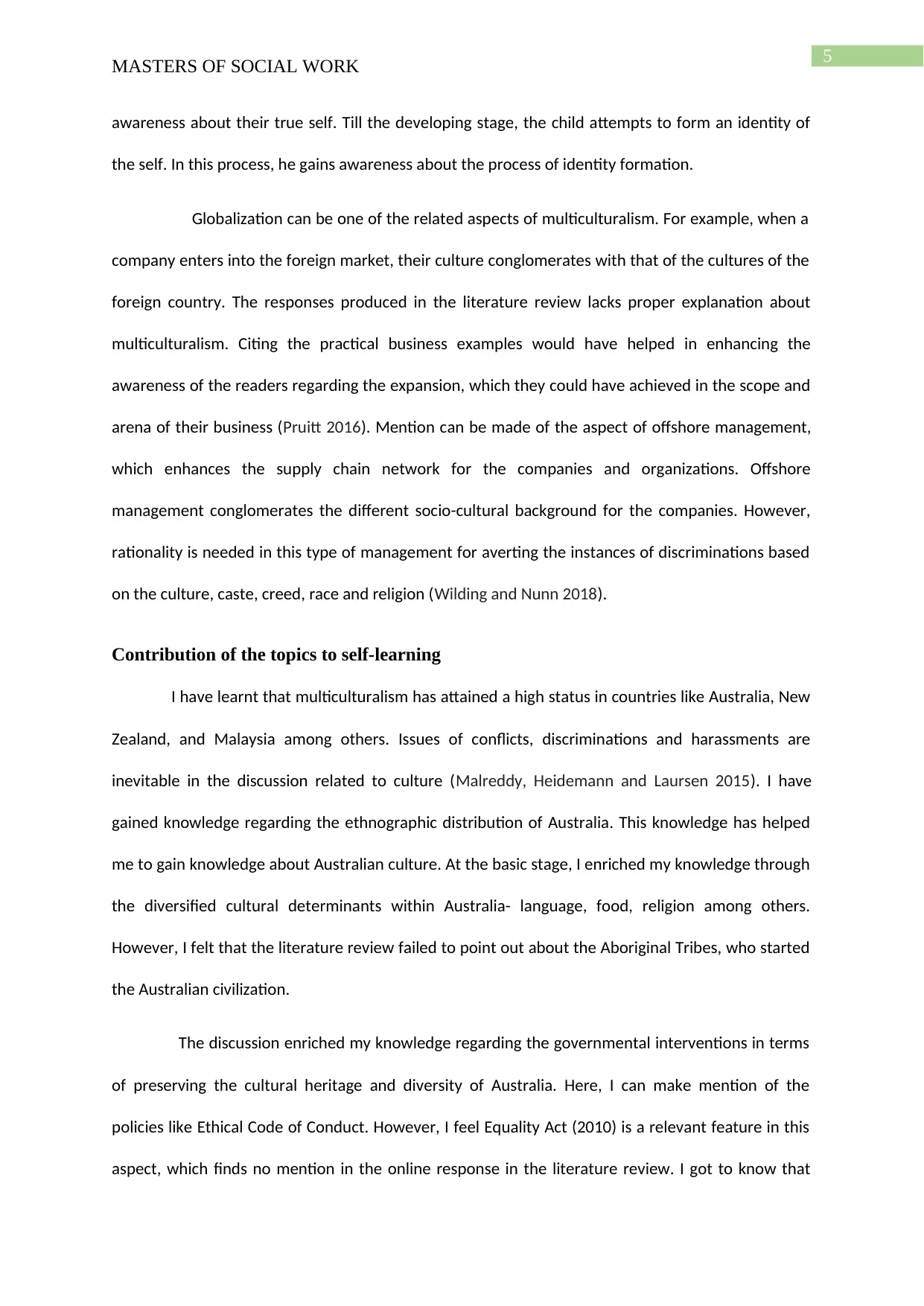
5
MASTERS OF SOCIAL WORK
awareness about their true self. Till the developing stage, the child attempts to form an identity of
the self. In this process, he gains awareness about the process of identity formation.
Globalization can be one of the related aspects of multiculturalism. For example, when a
company enters into the foreign market, their culture conglomerates with that of the cultures of the
foreign country. The responses produced in the literature review lacks proper explanation about
multiculturalism. Citing the practical business examples would have helped in enhancing the
awareness of the readers regarding the expansion, which they could have achieved in the scope and
arena of their business (Pruitt 2016). Mention can be made of the aspect of offshore management,
which enhances the supply chain network for the companies and organizations. Offshore
management conglomerates the different socio-cultural background for the companies. However,
rationality is needed in this type of management for averting the instances of discriminations based
on the culture, caste, creed, race and religion (Wilding and Nunn 2018).
Contribution of the topics to self-learning
I have learnt that multiculturalism has attained a high status in countries like Australia, New
Zealand, and Malaysia among others. Issues of conflicts, discriminations and harassments are
inevitable in the discussion related to culture (Malreddy, Heidemann and Laursen 2015). I have
gained knowledge regarding the ethnographic distribution of Australia. This knowledge has helped
me to gain knowledge about Australian culture. At the basic stage, I enriched my knowledge through
the diversified cultural determinants within Australia- language, food, religion among others.
However, I felt that the literature review failed to point out about the Aboriginal Tribes, who started
the Australian civilization.
The discussion enriched my knowledge regarding the governmental interventions in terms
of preserving the cultural heritage and diversity of Australia. Here, I can make mention of the
policies like Ethical Code of Conduct. However, I feel Equality Act (2010) is a relevant feature in this
aspect, which finds no mention in the online response in the literature review. I got to know that
MASTERS OF SOCIAL WORK
awareness about their true self. Till the developing stage, the child attempts to form an identity of
the self. In this process, he gains awareness about the process of identity formation.
Globalization can be one of the related aspects of multiculturalism. For example, when a
company enters into the foreign market, their culture conglomerates with that of the cultures of the
foreign country. The responses produced in the literature review lacks proper explanation about
multiculturalism. Citing the practical business examples would have helped in enhancing the
awareness of the readers regarding the expansion, which they could have achieved in the scope and
arena of their business (Pruitt 2016). Mention can be made of the aspect of offshore management,
which enhances the supply chain network for the companies and organizations. Offshore
management conglomerates the different socio-cultural background for the companies. However,
rationality is needed in this type of management for averting the instances of discriminations based
on the culture, caste, creed, race and religion (Wilding and Nunn 2018).
Contribution of the topics to self-learning
I have learnt that multiculturalism has attained a high status in countries like Australia, New
Zealand, and Malaysia among others. Issues of conflicts, discriminations and harassments are
inevitable in the discussion related to culture (Malreddy, Heidemann and Laursen 2015). I have
gained knowledge regarding the ethnographic distribution of Australia. This knowledge has helped
me to gain knowledge about Australian culture. At the basic stage, I enriched my knowledge through
the diversified cultural determinants within Australia- language, food, religion among others.
However, I felt that the literature review failed to point out about the Aboriginal Tribes, who started
the Australian civilization.
The discussion enriched my knowledge regarding the governmental interventions in terms
of preserving the cultural heritage and diversity of Australia. Here, I can make mention of the
policies like Ethical Code of Conduct. However, I feel Equality Act (2010) is a relevant feature in this
aspect, which finds no mention in the online response in the literature review. I got to know that
⊘ This is a preview!⊘
Do you want full access?
Subscribe today to unlock all pages.

Trusted by 1+ million students worldwide
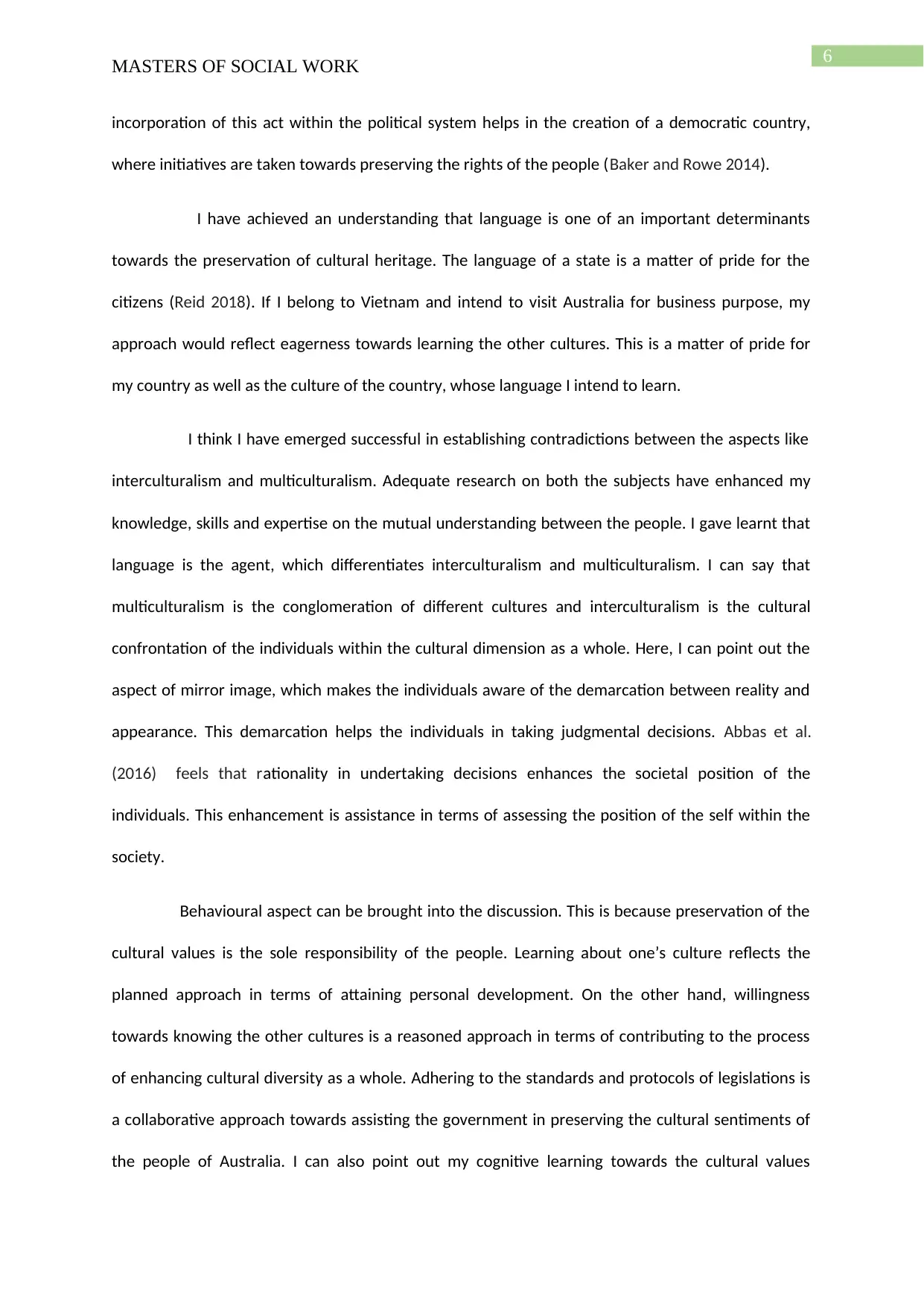
6
MASTERS OF SOCIAL WORK
incorporation of this act within the political system helps in the creation of a democratic country,
where initiatives are taken towards preserving the rights of the people (Baker and Rowe 2014).
I have achieved an understanding that language is one of an important determinants
towards the preservation of cultural heritage. The language of a state is a matter of pride for the
citizens (Reid 2018). If I belong to Vietnam and intend to visit Australia for business purpose, my
approach would reflect eagerness towards learning the other cultures. This is a matter of pride for
my country as well as the culture of the country, whose language I intend to learn.
I think I have emerged successful in establishing contradictions between the aspects like
interculturalism and multiculturalism. Adequate research on both the subjects have enhanced my
knowledge, skills and expertise on the mutual understanding between the people. I gave learnt that
language is the agent, which differentiates interculturalism and multiculturalism. I can say that
multiculturalism is the conglomeration of different cultures and interculturalism is the cultural
confrontation of the individuals within the cultural dimension as a whole. Here, I can point out the
aspect of mirror image, which makes the individuals aware of the demarcation between reality and
appearance. This demarcation helps the individuals in taking judgmental decisions. Abbas et al.
(2016) feels that rationality in undertaking decisions enhances the societal position of the
individuals. This enhancement is assistance in terms of assessing the position of the self within the
society.
Behavioural aspect can be brought into the discussion. This is because preservation of the
cultural values is the sole responsibility of the people. Learning about one’s culture reflects the
planned approach in terms of attaining personal development. On the other hand, willingness
towards knowing the other cultures is a reasoned approach in terms of contributing to the process
of enhancing cultural diversity as a whole. Adhering to the standards and protocols of legislations is
a collaborative approach towards assisting the government in preserving the cultural sentiments of
the people of Australia. I can also point out my cognitive learning towards the cultural values
MASTERS OF SOCIAL WORK
incorporation of this act within the political system helps in the creation of a democratic country,
where initiatives are taken towards preserving the rights of the people (Baker and Rowe 2014).
I have achieved an understanding that language is one of an important determinants
towards the preservation of cultural heritage. The language of a state is a matter of pride for the
citizens (Reid 2018). If I belong to Vietnam and intend to visit Australia for business purpose, my
approach would reflect eagerness towards learning the other cultures. This is a matter of pride for
my country as well as the culture of the country, whose language I intend to learn.
I think I have emerged successful in establishing contradictions between the aspects like
interculturalism and multiculturalism. Adequate research on both the subjects have enhanced my
knowledge, skills and expertise on the mutual understanding between the people. I gave learnt that
language is the agent, which differentiates interculturalism and multiculturalism. I can say that
multiculturalism is the conglomeration of different cultures and interculturalism is the cultural
confrontation of the individuals within the cultural dimension as a whole. Here, I can point out the
aspect of mirror image, which makes the individuals aware of the demarcation between reality and
appearance. This demarcation helps the individuals in taking judgmental decisions. Abbas et al.
(2016) feels that rationality in undertaking decisions enhances the societal position of the
individuals. This enhancement is assistance in terms of assessing the position of the self within the
society.
Behavioural aspect can be brought into the discussion. This is because preservation of the
cultural values is the sole responsibility of the people. Learning about one’s culture reflects the
planned approach in terms of attaining personal development. On the other hand, willingness
towards knowing the other cultures is a reasoned approach in terms of contributing to the process
of enhancing cultural diversity as a whole. Adhering to the standards and protocols of legislations is
a collaborative approach towards assisting the government in preserving the cultural sentiments of
the people of Australia. I can also point out my cognitive learning towards the cultural values
Paraphrase This Document
Need a fresh take? Get an instant paraphrase of this document with our AI Paraphraser
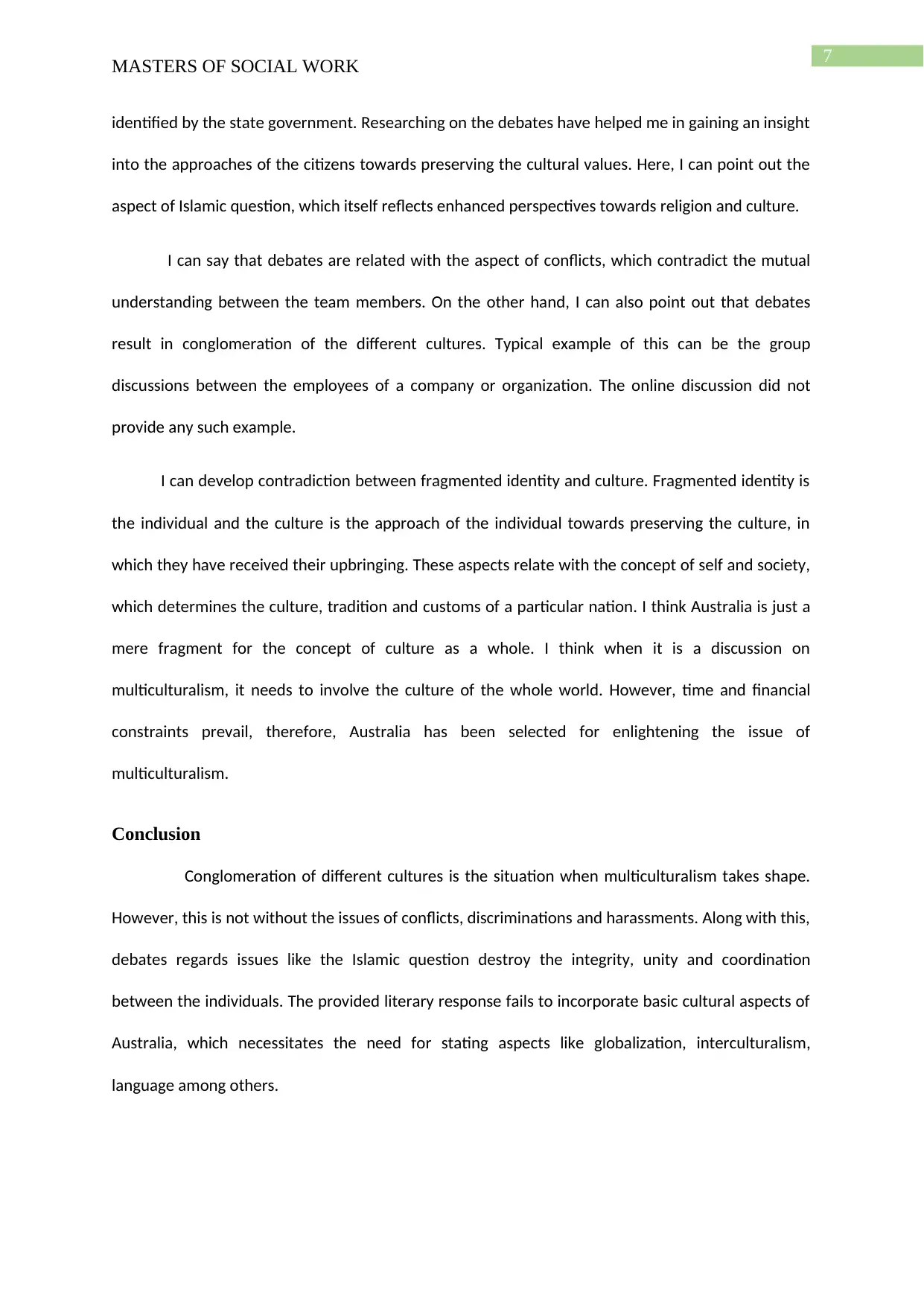
7
MASTERS OF SOCIAL WORK
identified by the state government. Researching on the debates have helped me in gaining an insight
into the approaches of the citizens towards preserving the cultural values. Here, I can point out the
aspect of Islamic question, which itself reflects enhanced perspectives towards religion and culture.
I can say that debates are related with the aspect of conflicts, which contradict the mutual
understanding between the team members. On the other hand, I can also point out that debates
result in conglomeration of the different cultures. Typical example of this can be the group
discussions between the employees of a company or organization. The online discussion did not
provide any such example.
I can develop contradiction between fragmented identity and culture. Fragmented identity is
the individual and the culture is the approach of the individual towards preserving the culture, in
which they have received their upbringing. These aspects relate with the concept of self and society,
which determines the culture, tradition and customs of a particular nation. I think Australia is just a
mere fragment for the concept of culture as a whole. I think when it is a discussion on
multiculturalism, it needs to involve the culture of the whole world. However, time and financial
constraints prevail, therefore, Australia has been selected for enlightening the issue of
multiculturalism.
Conclusion
Conglomeration of different cultures is the situation when multiculturalism takes shape.
However, this is not without the issues of conflicts, discriminations and harassments. Along with this,
debates regards issues like the Islamic question destroy the integrity, unity and coordination
between the individuals. The provided literary response fails to incorporate basic cultural aspects of
Australia, which necessitates the need for stating aspects like globalization, interculturalism,
language among others.
MASTERS OF SOCIAL WORK
identified by the state government. Researching on the debates have helped me in gaining an insight
into the approaches of the citizens towards preserving the cultural values. Here, I can point out the
aspect of Islamic question, which itself reflects enhanced perspectives towards religion and culture.
I can say that debates are related with the aspect of conflicts, which contradict the mutual
understanding between the team members. On the other hand, I can also point out that debates
result in conglomeration of the different cultures. Typical example of this can be the group
discussions between the employees of a company or organization. The online discussion did not
provide any such example.
I can develop contradiction between fragmented identity and culture. Fragmented identity is
the individual and the culture is the approach of the individual towards preserving the culture, in
which they have received their upbringing. These aspects relate with the concept of self and society,
which determines the culture, tradition and customs of a particular nation. I think Australia is just a
mere fragment for the concept of culture as a whole. I think when it is a discussion on
multiculturalism, it needs to involve the culture of the whole world. However, time and financial
constraints prevail, therefore, Australia has been selected for enlightening the issue of
multiculturalism.
Conclusion
Conglomeration of different cultures is the situation when multiculturalism takes shape.
However, this is not without the issues of conflicts, discriminations and harassments. Along with this,
debates regards issues like the Islamic question destroy the integrity, unity and coordination
between the individuals. The provided literary response fails to incorporate basic cultural aspects of
Australia, which necessitates the need for stating aspects like globalization, interculturalism,
language among others.
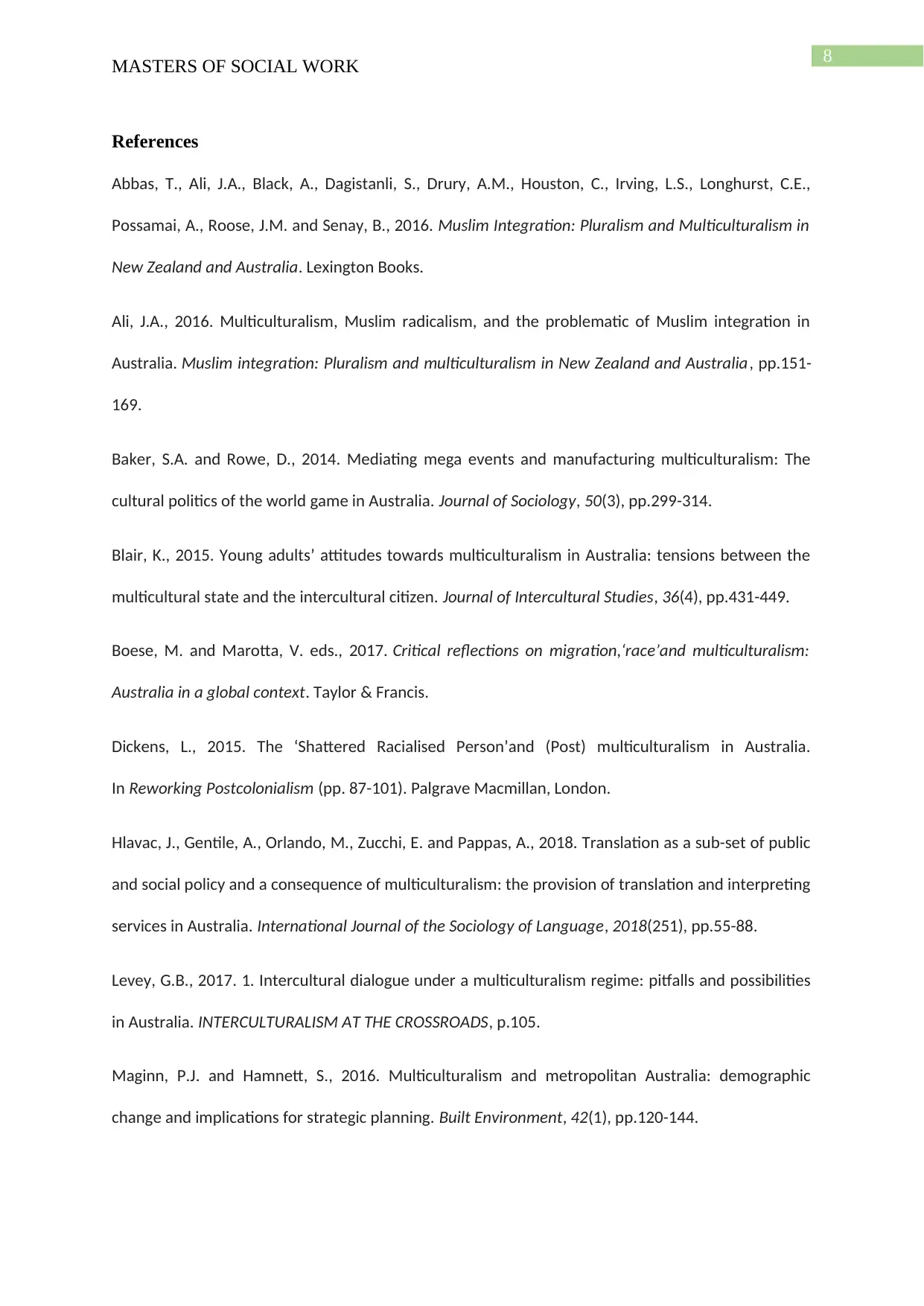
8
MASTERS OF SOCIAL WORK
References
Abbas, T., Ali, J.A., Black, A., Dagistanli, S., Drury, A.M., Houston, C., Irving, L.S., Longhurst, C.E.,
Possamai, A., Roose, J.M. and Senay, B., 2016. Muslim Integration: Pluralism and Multiculturalism in
New Zealand and Australia. Lexington Books.
Ali, J.A., 2016. Multiculturalism, Muslim radicalism, and the problematic of Muslim integration in
Australia. Muslim integration: Pluralism and multiculturalism in New Zealand and Australia, pp.151-
169.
Baker, S.A. and Rowe, D., 2014. Mediating mega events and manufacturing multiculturalism: The
cultural politics of the world game in Australia. Journal of Sociology, 50(3), pp.299-314.
Blair, K., 2015. Young adults’ attitudes towards multiculturalism in Australia: tensions between the
multicultural state and the intercultural citizen. Journal of Intercultural Studies, 36(4), pp.431-449.
Boese, M. and Marotta, V. eds., 2017. Critical reflections on migration,‘race’and multiculturalism:
Australia in a global context. Taylor & Francis.
Dickens, L., 2015. The ‘Shattered Racialised Person’and (Post) multiculturalism in Australia.
In Reworking Postcolonialism (pp. 87-101). Palgrave Macmillan, London.
Hlavac, J., Gentile, A., Orlando, M., Zucchi, E. and Pappas, A., 2018. Translation as a sub-set of public
and social policy and a consequence of multiculturalism: the provision of translation and interpreting
services in Australia. International Journal of the Sociology of Language, 2018(251), pp.55-88.
Levey, G.B., 2017. 1. Intercultural dialogue under a multiculturalism regime: pitfalls and possibilities
in Australia. INTERCULTURALISM AT THE CROSSROADS, p.105.
Maginn, P.J. and Hamnett, S., 2016. Multiculturalism and metropolitan Australia: demographic
change and implications for strategic planning. Built Environment, 42(1), pp.120-144.
MASTERS OF SOCIAL WORK
References
Abbas, T., Ali, J.A., Black, A., Dagistanli, S., Drury, A.M., Houston, C., Irving, L.S., Longhurst, C.E.,
Possamai, A., Roose, J.M. and Senay, B., 2016. Muslim Integration: Pluralism and Multiculturalism in
New Zealand and Australia. Lexington Books.
Ali, J.A., 2016. Multiculturalism, Muslim radicalism, and the problematic of Muslim integration in
Australia. Muslim integration: Pluralism and multiculturalism in New Zealand and Australia, pp.151-
169.
Baker, S.A. and Rowe, D., 2014. Mediating mega events and manufacturing multiculturalism: The
cultural politics of the world game in Australia. Journal of Sociology, 50(3), pp.299-314.
Blair, K., 2015. Young adults’ attitudes towards multiculturalism in Australia: tensions between the
multicultural state and the intercultural citizen. Journal of Intercultural Studies, 36(4), pp.431-449.
Boese, M. and Marotta, V. eds., 2017. Critical reflections on migration,‘race’and multiculturalism:
Australia in a global context. Taylor & Francis.
Dickens, L., 2015. The ‘Shattered Racialised Person’and (Post) multiculturalism in Australia.
In Reworking Postcolonialism (pp. 87-101). Palgrave Macmillan, London.
Hlavac, J., Gentile, A., Orlando, M., Zucchi, E. and Pappas, A., 2018. Translation as a sub-set of public
and social policy and a consequence of multiculturalism: the provision of translation and interpreting
services in Australia. International Journal of the Sociology of Language, 2018(251), pp.55-88.
Levey, G.B., 2017. 1. Intercultural dialogue under a multiculturalism regime: pitfalls and possibilities
in Australia. INTERCULTURALISM AT THE CROSSROADS, p.105.
Maginn, P.J. and Hamnett, S., 2016. Multiculturalism and metropolitan Australia: demographic
change and implications for strategic planning. Built Environment, 42(1), pp.120-144.
⊘ This is a preview!⊘
Do you want full access?
Subscribe today to unlock all pages.

Trusted by 1+ million students worldwide
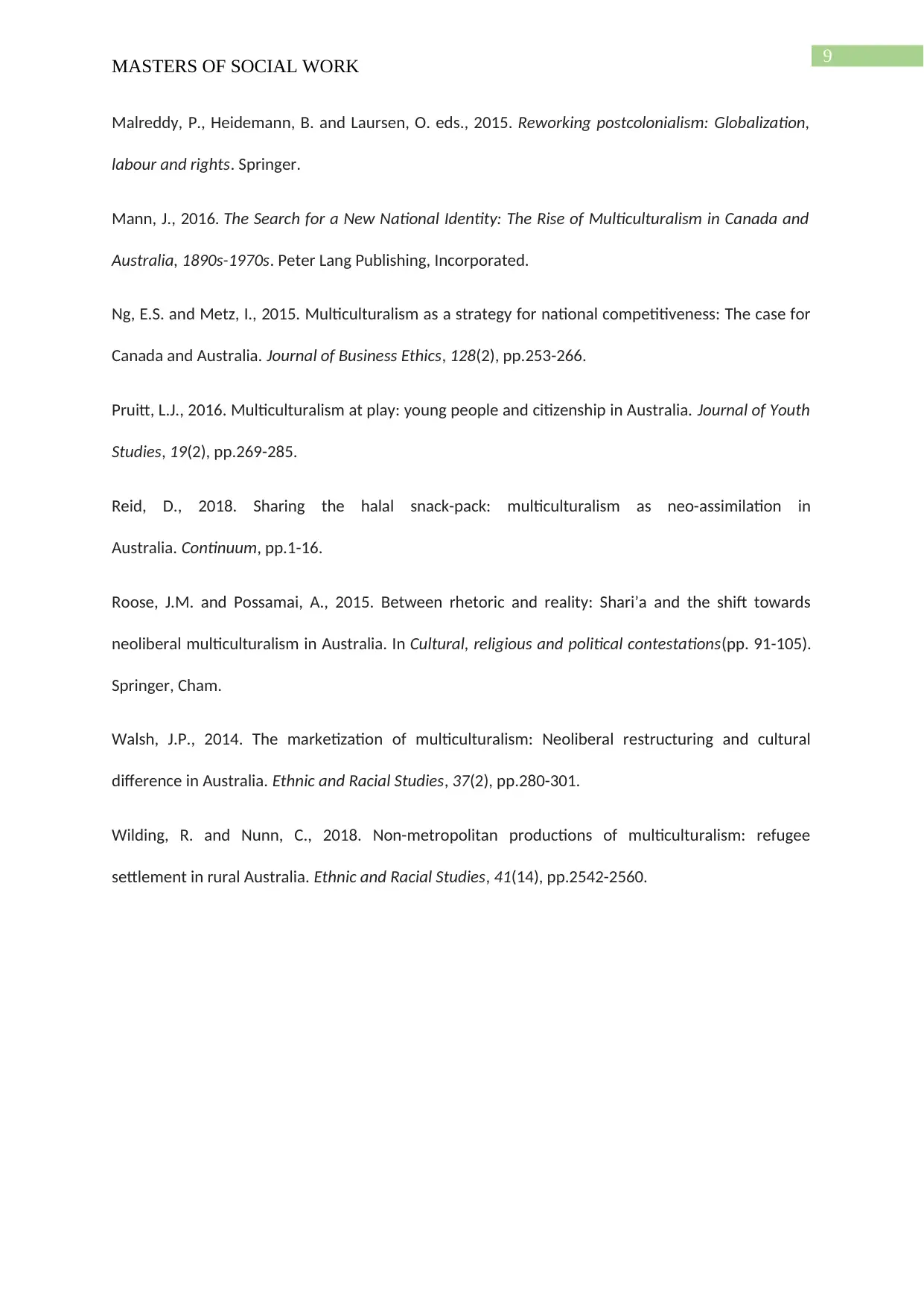
9
MASTERS OF SOCIAL WORK
Malreddy, P., Heidemann, B. and Laursen, O. eds., 2015. Reworking postcolonialism: Globalization,
labour and rights. Springer.
Mann, J., 2016. The Search for a New National Identity: The Rise of Multiculturalism in Canada and
Australia, 1890s-1970s. Peter Lang Publishing, Incorporated.
Ng, E.S. and Metz, I., 2015. Multiculturalism as a strategy for national competitiveness: The case for
Canada and Australia. Journal of Business Ethics, 128(2), pp.253-266.
Pruitt, L.J., 2016. Multiculturalism at play: young people and citizenship in Australia. Journal of Youth
Studies, 19(2), pp.269-285.
Reid, D., 2018. Sharing the halal snack-pack: multiculturalism as neo-assimilation in
Australia. Continuum, pp.1-16.
Roose, J.M. and Possamai, A., 2015. Between rhetoric and reality: Shari’a and the shift towards
neoliberal multiculturalism in Australia. In Cultural, religious and political contestations(pp. 91-105).
Springer, Cham.
Walsh, J.P., 2014. The marketization of multiculturalism: Neoliberal restructuring and cultural
difference in Australia. Ethnic and Racial Studies, 37(2), pp.280-301.
Wilding, R. and Nunn, C., 2018. Non-metropolitan productions of multiculturalism: refugee
settlement in rural Australia. Ethnic and Racial Studies, 41(14), pp.2542-2560.
MASTERS OF SOCIAL WORK
Malreddy, P., Heidemann, B. and Laursen, O. eds., 2015. Reworking postcolonialism: Globalization,
labour and rights. Springer.
Mann, J., 2016. The Search for a New National Identity: The Rise of Multiculturalism in Canada and
Australia, 1890s-1970s. Peter Lang Publishing, Incorporated.
Ng, E.S. and Metz, I., 2015. Multiculturalism as a strategy for national competitiveness: The case for
Canada and Australia. Journal of Business Ethics, 128(2), pp.253-266.
Pruitt, L.J., 2016. Multiculturalism at play: young people and citizenship in Australia. Journal of Youth
Studies, 19(2), pp.269-285.
Reid, D., 2018. Sharing the halal snack-pack: multiculturalism as neo-assimilation in
Australia. Continuum, pp.1-16.
Roose, J.M. and Possamai, A., 2015. Between rhetoric and reality: Shari’a and the shift towards
neoliberal multiculturalism in Australia. In Cultural, religious and political contestations(pp. 91-105).
Springer, Cham.
Walsh, J.P., 2014. The marketization of multiculturalism: Neoliberal restructuring and cultural
difference in Australia. Ethnic and Racial Studies, 37(2), pp.280-301.
Wilding, R. and Nunn, C., 2018. Non-metropolitan productions of multiculturalism: refugee
settlement in rural Australia. Ethnic and Racial Studies, 41(14), pp.2542-2560.
1 out of 10
Your All-in-One AI-Powered Toolkit for Academic Success.
+13062052269
info@desklib.com
Available 24*7 on WhatsApp / Email
![[object Object]](/_next/static/media/star-bottom.7253800d.svg)
Unlock your academic potential
Copyright © 2020–2026 A2Z Services. All Rights Reserved. Developed and managed by ZUCOL.